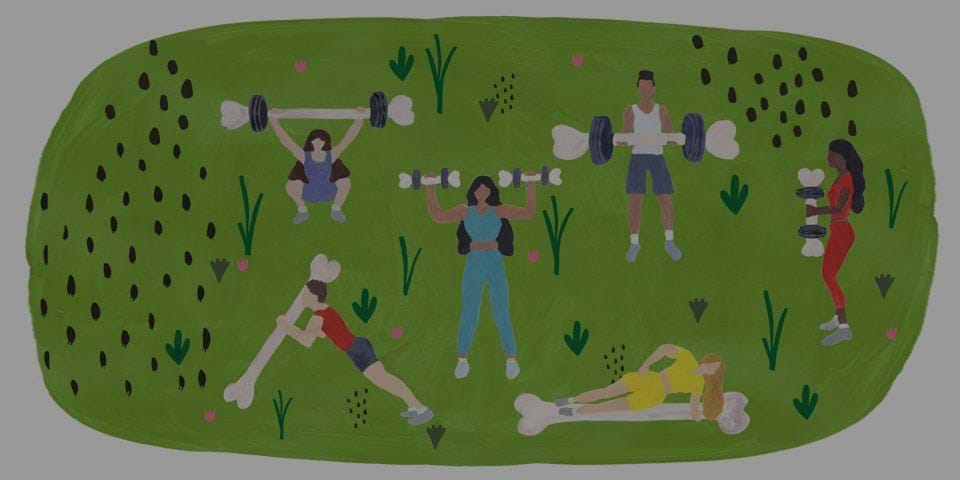Everyone knows that to lose weight we need to eat less and exercise more, but you argue that some people are fighting biology every step of the way – a genetic disposition to obesity. What genes?
We now know of over 100 genes that are involved. Not fat genes, or thin genes, but a mix of different genes that influence why some people might have a BMI (body mass index) of 27 and why some have a BMI of 23.
The truth is that we still don’t know about a lot of these genes, but we know about some of them. One set affects how well your brain senses how much fat you have. It’s important that your brain knows that, to know how long you can last without food. If your brain is slightly less sensitive to that signal, it thinks you have less fat than you do, and your brain is telling you to eat more than you need.
And there are genes that influence how your brain responds to what’s going on in your gut?
Yes, your brain also has an exquisite sensitivity to how many calories you’re eating, and how much comes from fat and from carbohydrates, etc. Your brain senses these signals through the repertoire of hormones that are secreted in your gut, from when food comes down through your throat into your stomach, into your small intestine and out the poo shoot. If your brain is slightly less sensitive to these signals, you end up eating more.
But don’t we often eat too much of something because it tastes good?
That’s the reward pathway of the brain, the third pathway that we know about. Your brain senses how many calories it needs — it’s like the petrol gauge — that if you burn 2000 calories you’d better eat 2000 calories.
But when we were on the Serengeti we might have burned calories bringing down the antelope, but eating 2000 calories to replace them wouldn’t buffer you against the future, when you fail to bring down the antelope. The reward pathway of the brain tells you to eat more. I call it the ‘oooh factor’, the feeling you get when you eat a piece of chocolate cake. It makes people feel good, it makes sugar and fat taste better; genetic variants make some people more susceptible to the ‘ooh factor’. It’s the different mixes of all these genes that make some people eat more and some people eat less.
But if our ancestors evolved in an environment when they didn’t know where the next dinner was coming from, why aren’t we all obese?
All of us respond the same way to starvation, because if we didn’t, we’d die; we’ve evolved to respond to potential starvation, by eating more and saving energy. But we haven’t developed a universal response to an obesogenic environment. So it’s a genetically drifty thing. Some people get fatter than others because there was no need to respond to that, whereas there was an absolute requirement to respond to not getting enough food.
You’ve been looking at the FTO genes, the genes most commonly associated with obesity.
I’ve spent the last eight years of my life dealing with that set of genes! FTO is a very complex molecule; we think it acts as a protein sensor, which influences food intake. It makes you hungrier.
These influences are very subtle, but 50 percent of human species carry at least one risk copy of FTO, and on average the person who has one FTO is 1.5 kilos heavier than average. If you have two copies, you’re three kilos heavier. So while the effect is subtle, it influences a lot of people.
And the FTO also influences the way a body responds to exercise?
That’s the weird thing. FTO affects the way your brain senses protein, that makes you eat more, but it’s also particularly responsive to exercise. You might think that of course it would, that if you have genes that are likely to make you bigger, you’ll ameliorate the effects by exercise, but that isn’t true for the majority of these genes. If you have two copies of this gene you’ll be, on average, three kilos heavier, but if you exercise, you’ll reduce your genetic burden by half – you’ll only be 1.5 kilos heavier than average. That isn’t true for the other genes I’ve been talking about that influence weight – if you have those genes you’ll still be larger whether or not you’re physically active. We don’t know why, and it’s going to be complicated to find out, but the results are real. Of course exercise is good for you, independent of weight loss, but those with FTO have the added benefit of being able to mitigate against their genetic burden.
Once – if? – you understand these genes, then what?
That is the 64-million-dollar question. The goal is that people will be able to get a gene test and then we can develop a personalized way of trying to address people’s obesity. For some, exercise is going to play a bigger part in weight loss and in others it might not. Some people might respond more to protein, and others to fat, which could influence what diet might work for them. That’s the goal, to use genetic tests to tailor a strategy for your health and your wellbeing. But we’re not there yet and while a lot companies are already trying to offer this now, we don’t have the information yet. So any company claiming to be able to do that now is talking bollocks.
We can’t change our biology, and many of those working in public health say we need to change the (high-sugar, high-fat) environment, through legislation such as a sugar tax.
We still need to understand the biological variants, why people behave and respond differently to the environment. Of course, we’re never going to fix the problem without fixing the environment, but people are going to respond differently to that. A sugar tax might work for some people but not others ... some people don’t like sugar at all, so a sugar tax will have no impact on their ability to lose weight. To make appropriate environmental changes we need to know more about how people are going to respond to the environmental changes.
Listen to Giles Yeo discussing the effect of our genes on exercise and weight loss here.

Dr Giles Yeo is a principal research associate and group leader at Cambridge University’s Metabolic Research Labs, and also a popular television personality, having presented for the BBC 2’s Horizon programs Why Are We Getting So Fat? and Clean Eating - The Dirty Truth.
If you want more health and fitness inspiration simply sign up to Fit Planet and get the freshest insights and advice straight to your inbox.







